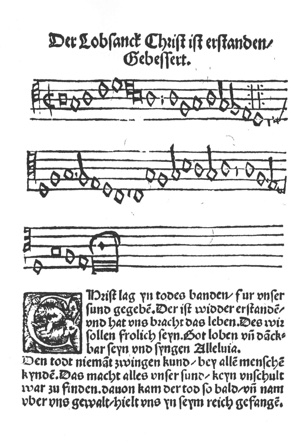Tune: Christ lag in Todesbanden
-
Christ Jesus lay in death’s strong bands,
For our offenses given;
But now at God’s right hand He stands
And brings us life from heaven.
Therefore let us joyful be
And sing to God right thankfully
Loud songs of alleluia!
Alleluia! -
No son of man could conquer Death,
Such ruin sin had wrought us.
No innocence was found on earth,
And therefore Death had brought us
Into bondage from of old
And ever grew more strong and bold
And held us as his captive.
Alleluia! -
But Jesus Christ, God’s only Son,
To our low state descended;
The pow’r of sin He hath undone,
The might of Death is ended:
Stripped of pow’r, no more he reigns;
An empty form alone remains;
His sting is lost forever.
Alleluia! -
It was a strange and dreadful strife
When Life and Death contended;
The victory remained with Life,
The reign of Death was ended.
Holy Scripture plainly saith
That Death is swallowed up by Death,
Made henceforth a derision.
Alleluia! -
Here our true Paschal Lamb we see,
Whom God so freely gave us;
He died on the accursèd tree—
So strong His love!—to save us.
See, His blood doth mark our door;
Faith points to it, Death passes o’er,
The Murd’rer cannot harm us.
Alleluia! -
So let us keep the festival
Whereto the Lord invites us;
Christ is Himself the Joy of all,
The Sun that warms and lights us.
By His grace doth He impart
Eternal sunshine to the heart;
The night of sin is ended.
Alleluia! -
Then let us feast this Easter Day
On Christ, the Bread of heaven;
The Word of Grace hath purged away
The old and evil leaven.
Christ alone our souls will feed,
He is our meat and drink indeed;
Faith lives upon no other.
Alleluia!
Christ lag in Todesbanden
Martin Luther, 1524
Tr. Richard Massie, 1854, alt.
Tune: Christ lag in Todesbanden
-
Christ lag in Todesbanden,
Für unser Sünd gegeben,
Der ist wider erstanden
Und hat uns bracht das Leben.
Des wir sollen fröhlich sein,
Gott loben und dankbar sein
Und singen Alleluia!
Alleluia! -
Den Tod niemand zwingen kunnt
Bei allen Menschenkinden,
Das macht alles unser Sünd,
Kein Unschuld war zu finden.
Davon kam der Tod so bald
Und nahm über uns Gewalt,
Hielt uns in seim Reich gefangen.
Alleluia! -
Jesus Christus, Gottes Sohn,
An unser Statt ist kommen
Und hat die Sünd abgetan,
Damit dem Tod genommen
All sein Recht und sein Gewalt,
Da bleibt nichts denn Todsgestalt,
Den Stachel hat er verloren.
Alleluia! -
Es war ein wunderlich Krieg,
Da Tod und Leben rungen;
Das Leben behielt den Sieg,
Es hat den Tod verschlungen;
Die Schrift hat verkündet das,
Wie ein Tod den andern fraß,
Ein Spott aus dem Tod ist worden.
Alleluia! -
Hier ist das recht Osterlamm,
Davon Gott hat geboten,
Das ist an des Kreuzes Stamm
In Heißer Lieb gebraten;
Des Blut zeichnet unser Tür,
Das hält der Glaub dem Tod für,
Der Würger kann uns nicht rühren.
Alleluia! -
So feiern wir das hoh Fest
Mit Herzensfreud und Wonne,
Das uns der Herr scheinen läßt;
Er ist selber die Sonne,
Der durch seiner Gnaden Glanz
Erleucht unser Herzen ganz,
Der Sünden Nacht ist vergangen.
Alleluia! -
Wir essen und leben wohl
In rechten Osterfladen,
Der alte Saurteig nicht soll
Sein bei dem Wort der Gnaden.
Christus will die Koste sein
Und speisen die Seel allein,
Der Glaub will keins andern leben.
Alleluia!
Martin Luther, 1524
Source: C.F.W. Walther’s Kirchen-Gesangbuch, 1898 printing, No. 99
The following contains links that will direct you to merchants with whom I have an affiliate relationship, meaning that I receive a commission if you click through and make a purchase. As an Apple Services Performance Partner and as an Amazon Associate I earn from qualifying purchases.
There are a number of fine recordings of this hymn available. Here are a few of the best:
- Weser Renaissance performs an arrangement by Andreas Hammerschmidt on the album Andreas Hammerschmidt: Sacred Works, track 6 (iTunes• AmazonMP3 [affiliate links]).
- Con Anima performs an arrangement by Michael Praetorius on the album Gelobet seist du, track 23 (iTunes • AmazonMP3 [affiliate links]).
- Schola Stralsundensis performs an arrangement by Antonio Scandello, an Italian musician who served for some time in Dresden and made valuable contributions to the Lutheran chorale tradition, on the album Petitiones Cordis, track 7 (iTunes • AmazonMP3 [affiliate links]).
- Ensemble Sagittarius performs an arrangement by Johann Hermann Schein, from his Opella Nova, on the album J.H. Schein: Opella Nova & Fontana d’Israel, track 15 (iTunes • AmazonMP3 [affiliate links]).
Author: Martin Luther
Source: Eyn Enchiridion oder Handbüchlein, Erfurt, 1524
Luther’s hymn “Christ Jesus Lay in Death’s Strong Bands (Christ lag in Todesbanden)” is his reworking and expansion of the earlier “Christ Is Arisen (Christ ist erstanden),” which was one of his favorite hymns. It first appeared in the Erfurt Enchiridion of 1524. From there it worked its way into virtually all subsequent Lutheran hymnals.

Luther’s original follows a rather more complex metrical form than the English version would suggest. The English is a straightforward 8.7. 8.7. 7.8. 7.4., whereas Luther’s German has seven syllables in each line leading up to the final Alleluia. That means that a slur is included in the first line of the A section that is not present in the English version, and for the meter to be maintained, the slur must move to a different syllable from stanza to stanza.
The translation, which is in the public domain, is that by Richard Massie, 1854, as altered for the Lutheran Service Book, 2006, No. 458, though some phrases have been restored from the Evangelical Lutheran Hymn-Book, 1927, No. 224, as better reflecting the German original.
